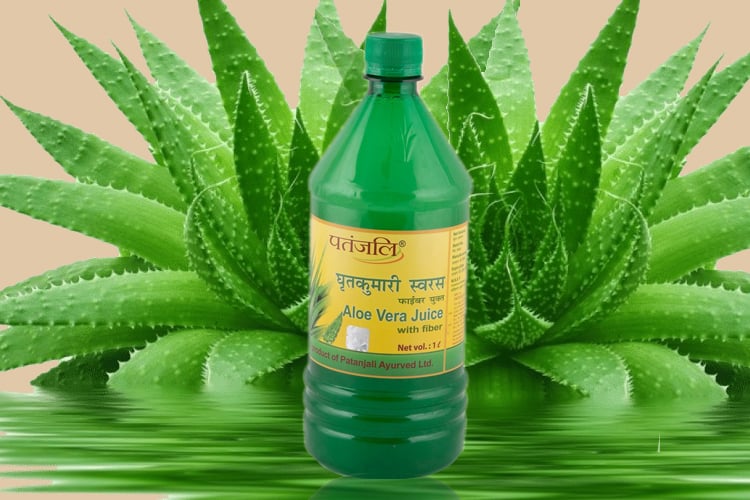Fans of natural health remedies have been on the aloe vera train for years. The skin soother in its topical form is used to treat everything from sunburns to eczema to acne. But lately, bottles of aloe vera juice and water have been popping up all over health food stores with claims that go beyond offering better skin. A quick Google search results in various purported benefits of sipping the spiky plant, like heartburn relief, improved digestion, and a boost in nutrients.
So we reached out to a few experts to find out how aloe juice stacks up to normal water, if it offers any special health perks, and whether or not it’s actually safe to drink. Here’s what you should know before you glug the aloe Kool-Aid.
What Are the Health Benefits Of Aloe Vera?
Many of the perks surrounding aloe vera juice are tied to research on the aloe plant itself, which provides proven health benefits thanks to its dose of vitamins, minerals, and antioxidants. First, there’s aloe’s antiseptic effects. Aloe contains various germ fighters like salicylic acid, which stave off bacteria, fungus, and viruses, according to a review of research published in the Indian Journal of Dermatology.
Then there’s aloe’s healing properties. In a 2015 review of various studies that examined aloe’s ability to help speed up healing, the authors concluded that putting a little aloe gel on a cut or burn can help it heal faster, according to the findings published in BioMed Research International.
Let’s not forget the wonders it can do for your skin. Aloe vera is an excellent natural moisturizer that contains anti-inflammatory properties (making it the perfect sunburn soother). One study even suggests aloe may help erase wrinkles with regular application.
Okay, Aloe Is Legit—but Is the Juice Worth Drinking?
There’s one major problem with aloe juice: Most research backing up aloe’s health benefits applies to the topical use of the plant. There’s just trace amounts of the good stuff found in juices and waters and the effects of ingesting them haven’t been well studied.
Pure aloe vera juice is made by crushing, grinding, or pressing the entire leaf of an aloe vera plant. This produces a liquid, which is then filtered. Many aloe juices are combined with other beverages, like fruit juice or tea, and you can find tons of varieties at stores like Whole Foods, Amazon, or Target. The thing is, “because of improper processing procedures many of these so called aloe products contain very little or virtually no active ingredients,” according to a review in the Journal of Food Science and Technology.
“Aloe vera juice is essentially water with a small amount of carbohydrates from sugar and an even smaller amount of vitamins and minerals,” says Allison Webster, Ph.D., R.D., associate director of nutrition communications at the International Food Information Council. “It’s often praised for providing B vitamins and vitamin C.”
It’s unclear how much of aloe’s beneficial nutrients actually end up in your drink, says Keri Gans, R.D. author of The Small Change Diet. “It’s the pulp that contains the nutrients. When you’re diluting it with the water, you’re definitely going to be losing nutrients,” she says.
The vitamins that do make it into aloe juice, “are just a tiny fraction of what we should be consuming every day,” adds Webster. “No research has been published on the effect of aloe juice on inflammation in humans, so until more studies are done, we really can’t say that it has any anti-inflammatory properties. The bottom line: aloe drinks aren’t likely to improve your skin or even help you meet your recommended daily intake for vitamins.”
Can Aloe Juice Still Be a Good Swap For Water?
Even though it’s not a miracle drink, can aloe vera juice still be a healthy hydration choice?
It depends. Because some aloe juices do contain added sugar or other fruit juices, they can offer extra calories, cautions Webster. A scan of the nutrition label will clue you in on whether that particular brand of aloe juice is really more like a soda.
Plus, some early evidence suggests aloe juice might actually be dangerous to drink thanks to a chemical aloe contains called anthraquinone, which has been linked to potential cancerous effects. A 2013 study done in rats looked at whether purified low-anthraquinone aloe was safe to drink. According to the findings published in Food and Chemical Toxicology, this appeared safe when compared to drinks containing higher levels of the potential carcinogen.
Still, it might be better to err on the side of caution, says Jeff Gladd, M.D., an advisory board member of Care/of. “I do not see the advantages or benefits of aloe juice, and given some of the concerns I’d advise steering clear.”
After weighing all the evidence, the choice is simple for Gans. “I hands-down recommend regular H2O over aloe juice,” she says. “There’s nothing questionable about water.” If you want to spice things up with natural flavoring, reach for some sliced fruit instead.
If you like it share this to your friends and loveone.
Follow and stay connected with health and beauty.










